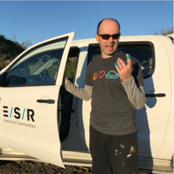Te pūtaiao raraunga me te AI
Data science & AI
ESR uses the power of data to gain insights and make a difference to the health and wellbeing of our communities.

About
ESR’s data science team is at the forefront of addressing priority challenges in public health, forensics and environment in Aotearoa, to improve the wellbeing and prosperity of our communities.
Data science & AI expertise
At ESR, we harness the power of data and AI to anticipate future challenges and develop innovative solutions.
By combining specialist data science expertise with ESR's focus areas of health, forensic, food, water, climate change and radiation sciences, we help explore new opportunities, support better scenario planning, and enable more informed decision-making in critical areas that impact us all.
We are committed to the ethical use of artificial intelligence and are proud to be a signatory of the Algorithm Charter of Aotearoa New Zealand, ensuring transparency, fairness and accountability in our AI-driven endeavours.
ESR's data science team:
-
Advances responsible data science by addressing ethical implications and adhering to responsible AI principles
-
Amplifies the impact of ESR's scientific outputs through data science, fostering innovation and collaboration across disciplines
-
Translates cutting-edge AI research into impactful outcomes, engaging with the state-of-the-art and building a reputation as a data science leader, and
-
Creates AI-powered products and services to enhance ESR's offerings for stakeholders and generate new revenue streams while positively impacting communities.
Using these principles, we explore new technologies, techniques and methodologies that contribute to the wellbeing of communities.
Case studies
Data science & AI case studies
Specialist services
Specialist services

Our team is dedicated to empowering public and private sector clients with data-driven insights and innovative solutions across a variety of areas. Our expertise spans machine learning predictive modelling, digital twins, generative AI with custom large language models, computer vision on edge devices, remote sensing and geographic information systems solutions.
Specialist services
Machine learning predictive modelling
Our team excels in machine learning predictive modelling, utilising advanced algorithms to forecast future trends and behaviours. We harness vast datasets to build precise models that aid in reducing uncertainties and enhancing decision-making processes. Our predictive models are crafted to help you foresee market dynamics, customer behaviour, and operational efficiencies, providing a competitive edge in your strategic planning.
Digital twins
In the realm of digital twins, we create virtual replicas of physical systems that are dynamically updated with real-time data. These models serve as a sandbox for simulation, analysis, and optimisation, allowing for improved product development and operational excellence. Our digital twin solutions are designed to mirror the complexities of your real-world assets, providing a platform for innovation and performance enhancement.
Generative AI and custom large language models
Our commitment to responsible AI extends to the field of generative AI, where we develop custom large language models that adhere to ethical standards. These models are capable of generating human-like text, aiding in content creation, and automating communication tasks. We ensure that our generative AI solutions are aligned with ethical guidelines, promoting transparency and fairness in AI applications.
Computer vision on edge devices
We specialise in implementing computer vision technologies on edge devices, enabling swift and efficient data processing at the source. This approach minimises latency, conserves bandwidth, and ensures prompt decision-making. Our edge-based computer vision applications range from real-time monitoring to advanced analytics, tailored to the unique requirements of your operations.
Remote sensing and GIS solutions
Our expertise in remote sensing and geographic imaging system (GIS) solutions translates into actionable intelligence from spatial data. We assist organizations in harnessing the power of geographic information to inform policy-making, enhance resource management, and optimise logistical workflows. Our solutions integrate disparate data sources into cohesive geospatial analyses, supporting a wide array of decision-making needs.
Get in touch
To speak with ESR's data science and AI team about how our specialist services could benefit you, contact us on datascience@esr.cri.nz.
Experts in the area
ESR's Data Science & AI Team
Algorithm Charter of Aotearoa New Zealand
Algorithm Charter of Aotearoa New Zealand
ESR is the first Crown Research Institute to become a signatory of the Algorithm Charter of Aotearoa New Zealand, reflecting our commitment to responsible AI and to ensuring New Zealanders have confidence in our use of algorithms. The Algorithm Charter of Aotearoa New Zealand is focused on ensuring accountability in the use of data, specifically in the areas of:
-
Transparency: maintaining transparency by clearly explaining how decisions are informed by algorithms
-
Partnership: delivering clear public benefit through Treaty commitments.
-
People: focusing on people.
-
Data: making sure data is fit for purpose
-
Privacy, ethics, and human rights: ensuring that privacy, ethics and human rights are safeguarded
-
Human oversight: retaining human oversight of decision making









